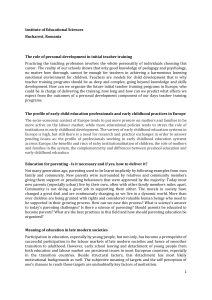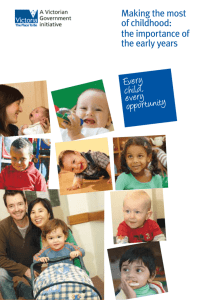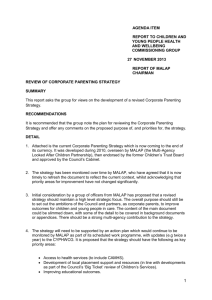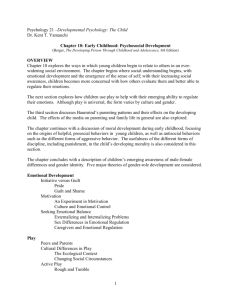Children, families and their communities
advertisement
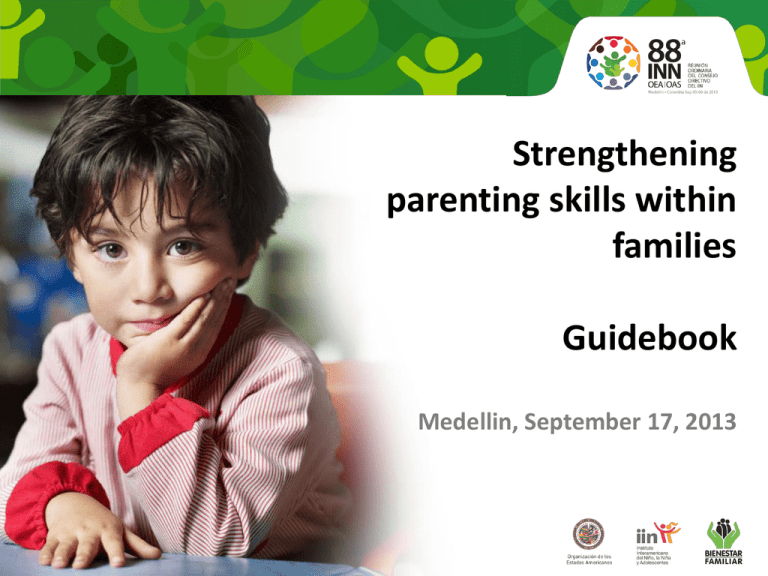
Strengthening parenting skills within families Guidebook Medellin, September 17, 2013 Content 1. General framework 2. Working with families and the differential approach 3. Strengthening key aspects of parenting 4. Methodological guidelines for working with families 5. Working with families with early childhood policies 1. General framework Background • Early childhood as a priority • 2010 –Backed by the Canadian International Development Agency, the Inter-American Children’s Institute (IIN) developed several technical assistance procedures in agreement with Colombia and Guatemala. • 2011 – During the 86th board of director’s meeting, Early Childhood became a priority for the 2012-2015 phase of the Action Plan. A Work Group (WG) made up by the following countries was created: Argentina, Brazil, Colombia, Costa Rica, USA, Guatemala, Haiti, Honduras, Mexico, Panama, Paraguay, Surinam and Uruguay. Background • 2012 – The WG scheduled several virtual meetings and created the basis for the document: Parenting guidelines to implement and manage early childhood public policies in accordance with children’s rights laws. • 2013 – First non-virtual meeting of the WG (Panama). The members exchanged information based on the parenting document and agreed that the comprehensiveness of the management model would be enriched by defining a set of guidelines for working with families. Background • Even though the current version of this document was previously approved by the WG and has already been distributed, any observations that come from this meeting can still be included in it. • The purpose of the parenting guidelines document is to make the most out of positive impact of the initiatives that promote healthy and safe family environments and contribute to the development of children. Why work with families? • Thanks to the efforts made in the region in recent years, a lot of new Early Childhood network services have been created, giving children access to new safe environments that contribute to their development. • Children are now able to act as active rights-holders by sharing new ways to play, expressing themselves, and doing “everyday activities” with their families. The work of the educator is to encourage these types of interactions. • Unfortunately, these interactions don’t always occur frequently and/or have the adequate staff capable of promoting these activities outside of the classroom and in the home environment. • This means there is a considerable gap between the stimulating environments a child will encounter at their educational center and at home with their family. If this gap aligns with cultural barriers, it can exacerbate a child’s social exclusion. Idea strength • It is necessary to amend comprehensive early childhood protection policies by ensuring they target each child's immediate environment. By doing so, it will be possible to get the most out of the work being done during inter-institutional meetings. • This leads to the proposal to implement an extensive outreach effort with qualified personnel capable of promoting new parenting habits while instilling a culture of respect between genders, generations and different cultures and values. Parenting capacity building • From the beginning of their lives, children partake in a culture in which it is important to understand the many factors that affect their development. • From a very early age children are directly affected by their family environment, which in turn is being influenced by much larger environments. • Promoting the parenting skills of adults affects not only the bond between parents and children, but it also helps foster new partnerships with service providers while helping improve the quality of these services. Parenting capacity building • Children's interactions with their caregivers are essential in helping them develop their own personalities. • Significant interactions between children and their caregivers are essential for early childhood development. • The dimensions along which the interactions will be significant are: frequency, intensity, timing, relevance and strength of the bond. • These interactions will be crucial for developing the skills and means needed to explore the world (learn), define relationship styles and come up with ways for dealing with conflict. • When we talk about caregivers we refer to those in close contact with the child and those who assume a key role in helping them develop bonds while also providing for their support or structure. Parenting capacity building • Families provide the context for, and are a “collective agent” in, these types of care. • Families determine their own roles and responsibilities when preparing for early childhood care according to age and gender. In our culture mothers are the primary caregivers, a role defined by tasks and not kinship. • By including parenting capacity building processes into public policies and coordinating them with protection networks, it will be possible to have a much larger impact on children´s environments. 2. Working with families and the differential approach THE DIFFERENTIAL APPROACH IS USED TO STRENGTHEN THE ROLE OF PARENTS, MOTHERS AND CAREGIVERS • Parenting styles are permeated by cultural, social and geographical factors. • In order to strengthen parenting styles, the history and conditions of the children and their families have to be taken into account. Diversity •Ethnicity: afro, indigenous, Rom •Location: rural and urban •Cultural: cultural characteristics of each community •Capabilities: the many capabilities of children •Family structure •Gender: Gender roles •Effects of violence or natural disasters •Unique environments surrounding families Why is the differential approach important when working with families and caregivers? • Values the potential, skills, abilities and customs of every person, family and local group. • Accepts the characteristics and specific needs of every group, especially of those that have not been heard from before. • Recognizes that diversity has been a main source of discrimination and has created large social gaps and exclusion. • Achieves social inclusion and equitable integration into society. • Guarantees the rights of every person, family and group by creating solutions based on their uniqueness. • Encourages gender equality in every family taking into account the evolution of the roles between men and women. • Acknowledges the impact caused by violence while helping families overcome the victim vs. victimizer dilemma. Implications of implementing the differential approach when working with families Develops the mechanisms for inquiring about, researching and identifying the needs, capabilities and strengths of the aforementioned groups. Creates policies that will empower families seeking inclusion and equity in their communities. Improves the parenting methods that will favor the comprehensive development of all children according to their unique needs. Maintains cultural legacies and social fabric Redefines gender roles in parenting 3. Strengthening key aspects of parenting Key parenting aspects to strengthen Horizon Parenting practices must contribute in different ways to the comprehensive development of children. Children and families as seen from a rights perspective Children, families and their communities Children, families and their communities immersed in the political and institutional spheres. Children and families as seen from a rights perspective Recognizes: •The entitlement of children’s rights •Their capabilities as able and active rights-holders •Their ability to operate based on the interaction with the people around them. •Progressive autonomy Involves: •Adults who can facilitate comprehensive human development based on the life stage, characteristics and capabilities. •Parents, mothers and family caregivers play key roles: They are guarantors, facilitators and mediators. Children and families as seen from a rights perspective (continuation) Development Existence Comprehensive Development Protection Citizenship Children and families as seen from a rights perspective (continuation) Development rights Right to life •Advancement of health •Healthy environments •Nutrition •Safety and health •Right to receive medical attention •Family planning •Quality interactions: promote exploration and language, sensory and movement exchange opportunities. They promote play, storytelling, music and art. •Parenting sensitivity •Safe affectionate bonds •Emotion regulation •Right to search and use cultural and recreational services Children and families as seen from a rights perspective (continuation) Right to protection Citizenship rights •Social, emotional and physical security: o Safe affectionate bonds attachment o Effective conflict resolution and safe environments o Safe physical environments that prevent accidents and promote health o Support during crisis situations •Listen to them (thoughts, feelings, opinions) •Acknowledge their ability to make decisions with others about the issues that affect them •Exercise citizenship differently from adults •Develop a sense of belonging Children, families and their communities • Families are part of a larger context • Identifying and/or creating and strengthening family and community support networks to: o Cope with (natural and social) adversity. o Accompany the development processes of others. o Help children develop feelings of identity and belonging. o Create safe environments that promote engagement. Children, families and their communities in the political and institutional spheres. • Families do not implement any isolated mechanisms without societal and institutional support. • Each actor (state, family, community and civic society) can and must develop mechanisms that will guarantee comprehensive childhood development. • Effective cooperation between families, communities and state institutions supports the creation of targeted mechanisms. 4. Methodological guidelines for working with families Characteristics of the methodology for working with families • Acknowledges a family’s knowledge, capacities, beliefs, experiences and values. • Reflexive and constructive dialogues that take into account the characteristics of individual and multiple families. • Because of their complex relationships and the internal and external factors that influence them, a family’s change process can take time. • The projected outcome of this exercise is not to inform or impart knowledge, but to promote the process analysis of practices and to facilitate attitude changes. The attitude and skills of trainers and family educators It is necessary for trainers working within a human rights and differential approach framework to: •Have an appreciative attitude towards the diverse customs and personal situations that families face - understanding that their vulnerabilities are obstacles they need to come to terms with or overcome, with help or by their own means. •Be open to a family’s diverse knowledge, culture, beliefs, experiences and values. •Be confident that each family will progress at its own pace. Attitude and skills of trainers and family educators Family work can be very diverse. In some instances some of the families will even work in groups. Examples: •Workshops •Single-family support or intervention sessions. •Combining workshops with media and communication-based methodologies that implement radio, television and internet as tools. •Use of tools like forums, campaigns, daily journals to complement more formal interactions. •Leisure and recreational activities to promote literature, art, celebration and playing time as reasons for families to create new ways to relate to their children. •Work directed specifically to adults, or, in some cases, to both children and their parents. Trainer profile and required skills What kind of trainers can we find? •Trainers have very different levels of education. •All trainers have their own understandings and beliefs about parenting. How should we evaluate them? • • Ability to create empathy and kind relationships. Ability to reflect on their own family’s interactions. • Family and early childhood development. • Family support and training methodologies. • Communication and methodology implementation skills. Trainer follow-up. 5. Training families in early childhood policies Comprehensive approach to early childhood public policies for working with families • Plan to include other early childhood care initiatives as part of family training and support. • Design comprehensive policies, guidelines and programs. • Develop a clear inter-institutional structure. • Develop medium and long-term strategic activities. • Devise proper strategies to reduce the gaps between educational services and family environments. • Develop a monitoring and tracking system. • Have clear guidelines and hire properly qualified personnel. Comprehensive approach to early childhood public policies for working with families Alternatives to providing family guidance, training and support: •Integrate guidelines into early childhood or family policies •Establish guidelines as part of an early childhood and/or family plan, program or care system •Create a program, plan or strategy It is necessary to define institutional roles for leadership: •A national entity •A sector responsible for organizing and connecting other sectors •An inter-institutional entity or commission We encourage states to reflect about the proposal and keep in mind the importance of incorporating this issue in public policy for early childhood, with the objective of moving forward in ensuring comprehensive development of children in the region. Thank You 09/14/13
